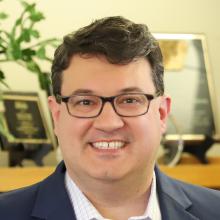Say Yes: It Could Change Your Career Trajectory

In August 2010, I walked into the first faculty meeting of the semester and sat down. It was my second year as a visiting instructor of communication studies at Clemson University. As with many yearly kickoff faculty meetings, the hour consisted of announcements related to the work to be done over the next nine months.
Near the end of the meeting, my department’s study abroad representative announced the faculty-led programs to be offered in summer 2011. At the time, students could complete the minor in communication studies during the summer at Clemson’s Brussels Center. My colleague Eddie announced the faculty members teaching the “Maymester” course and the summer first session courses and then announced that I would be the faculty member teaching the summer second session courses.
A Defining Moment
Heads swiveled toward me in surprise as colleagues and friends sought confirmation that I was doing this. Tempering my own surprise, I nodded my head to indicate that I was, indeed, going to be the faculty leader during the second summer session. After the meeting, I returned to my office, put down my notebook, and popped next door to Eddie’s office. I started the conversation by asking for more details about the study abroad program I was ostensibly now directing. He apologized for not talking to me before the meeting and then explained his rationale for selecting me as the faculty director. He told me that, in the year I’d been at Clemson, students had enjoyed my classes and interactions with them, which would be essential for recruiting. He also stated that I had distinguished myself as someone who would do the work required to lead a successful program.
Little did I know just how much uttering that one little word—“yes”—would change the direction of my career.
I said yes. I participated in a short-term faculty-led program as an undergraduate and enjoyed my experience abroad. One of my undergraduate majors was French, and I was excited to practice my language skills again—skills I hadn’t used in eight years. I really liked the students I was working with and thought it would be a great opportunity to get to know them better. I was also willing to embrace a new experience, learn how to develop a program, and put in the work required to execute it. Little did I know just how much uttering that one little word—“yes”—would change the direction of my career.
That July, I witnessed more growth in students than I had in years of working with them on campus. I valued education abroad prior to my time as a faculty leader, but I didn’t realize its full impact until I witnessed it. In August, I returned to the United States with a new goal: lead more study abroad programs. I didn’t realize then the implications this would have on my career trajectory. However, it ultimately led to a new faculty role (one I held for 10 years), the direction of multiple study abroad programs, involvement in multiple professional associations dedicated to international education, multiyear leadership of a campus committee overseeing international activities, leadership of the NAFSA Academy for International Education, a large network of friends and colleagues, and a new administrative role—senior international officer. All because I said yes.
My Hopes for Those Who Will Shape International Education in Future Decades
As I think about the future of the field and those entering it (both now and over the next decades), I have three hopes:
First, I hope they learn the field, its history, its value, its idiosyncrasies, its people, and its challenges. Over the past five years, I’ve had numerous opportunities to speak with new international education professionals. They are bright young thinkers who value what we do and have hopes and dreams of what they can do to make an impact on the field.
Yet, someone in an entry-level role is not in the position to effect substantive change in the way an institution operates. In light of this, I give those entering the field the following advice: Learn your job and learn your institution. Know that your role in an entry-level position is to do the work you were hired to do and to demonstrate you’re a competent employee. Hold on to your passion, your enthusiasm, your ideas, and your drive for change. They are important and will serve you well throughout your career. However, if you walk into your first international education position expecting you’re going to revolutionize the institution, you’re going to be sorely disappointed and extremely frustrated.
Second, I hope they prioritize professional development. The field requires continual growth. Ongoing learning and training are essential to maintain your professional skills. Saying yes was a starting point, but professional development is what propelled me to where I am today. Part of that development is building and maintaining quality professional networks. Entry-level jobs don’t last forever. As you progress in your career, professional development becomes more people centered. I don’t have the answer to every question that comes my way, but I have a network that probably does. Develop that network. It will sustain you throughout your career.
Saying yes was a starting point, but professional development is what propelled me to where I am today.
Finally, I hope new professionals will take on the challenges the field faces. We're often too focused on the status quo rather than on our future needs. For example, there is not yet an alternative equivalent to mobility. Collaborative Online International Learning (COIL) addresses some, but not all, outcomes associated with mobility. It also furthers equity, to an extent.
Additionally, mobility and sustainability are in direct tension with each other. How does mobility fit within a field championing the United Nations’ Sustainable Development Goals? We haven't begun to figure out our response to this challenge. We don’t even agree on the definition of “sustainability.” And these are only a few examples of the challenges that the field faces.
The new generations entering international education give me hope that we will address these issues. They’re far more concerned about people and the planet than prior generations. I’m hopeful that they will do better than we have done and are doing—the field and the future depend on them. •
Todd Lee Goen is the director of global education and senior international officer at the Virginia Military Institute and the 2023 chair of the NAFSA Academy.
About International Educator
International Educator is NAFSA’s flagship publication and has been published continually since 1990. As a record of the association and the field of international education, IE includes articles on a variety of topics, trends, and issues facing NAFSA members and their work.
From in-depth features to interviews with thought leaders and columns tailored to NAFSA’s knowledge communities, IE provides must-read context and analysis to those working around the globe to advance international education and exchange.
About NAFSA
NAFSA: Association of International Educators is the world's largest nonprofit association dedicated to international education and exchange. NAFSA serves the needs of more than 10,000 members and international educators worldwide at more than 3,500 institutions, in over 150 countries.
NAFSA membership provides you with unmatched access to best-in-class programs, critical updates, and resources to professionalize your practice. Members gain unrivaled opportunities to partner with experienced international education leaders.















